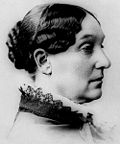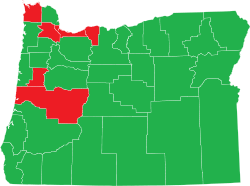- Oregon Ballot Measure 64 (2008)
-
Measure 64 Penalizes person, entity for using funds collected with "public resource" (defined) for "political purpose" (defined). Election results Yes or no Votes Percentage  No
No854,327 50.56% Yes 835,563 49.44% Invalid or blank votes % Total votes 1,689,890 100.00% Voter turnout 85.7% Election results by county YesNoSource: Oregon Secretary of State [1]
Oregon Ballot Measure 64 (IRR 25) was an initiated state statute ballot measure on the November 4, 2008 general election ballot in Oregon.This measure would have prohibited money collected with the use of public resources from being used for political purposes, except elections, official voter pamphlets and most lobbying. "Political purpose" is defined as: candidates, political committee or party, initiative or referendum committee, and supporting/opposing candidates or ballot measures (including signature gathering for petitions).[2]
Contents
Background
See also: List of Oregon ballot measuresThe measure was initially filed as a potential initiative by chief petitioner Bill Sizemore in 2006. In December 2007, Sizemore turned in 139,000 signatures to qualify the measure for the November 2008 ballot.
Sizemore put similar measures on the Oregon ballot in 1998 and 2000; all of them were defeated by a coalition of unions, charities, and non-profit organizations. Measure 59 was defeated 51–49; two years later, Measure 92 was defeated by a wider margin: 55–45. Also in 2000, another similar measure, Measure 98, was defeated 53–47.
Sizemore has filed nearly identical initiatives every two years since, although none qualified for the ballot until 2008. For 2010, he's filed Initiative Petition 25, which would make political contributions from unions "bribery."
Newspaper Endorsements
Here is how Oregon's major newspapers have endorsed on Measure 64:
Newspapers Yes No The Oregonian No Medford Mail-Tribune No Statesman Journal No Bend Bulletin No Portland Tribune No Eugene Register-Guard No Daily Astorian No East Oregonian No Corvallis Gazette Times No Coos Bay The World No Willamette Week No Yamhill Valley News Register No Gresham Outlook No No Oregon newspapers have endorsed a yes vote on Measure 64.
Supporters
The official name of the initiative petition committee to put Measure 64 on the ballot was "Ban Public Money for Politics".[3]
The Oregonian reported in September 2007 that Nevada-based millionaire Loren Parks was the leading contributor to put Measure 64 on the ballot.[4] According to the newspaper, Parks gave money directly to the signature gathering firm, rather than to Sizemore directly.
Opponents
Measure 64 is opposed by the Don't Silence Our Voice committee. It is also opposed by the Defend Oregon Coalition, which opposed all of Bill Sizemore's 2008 ballot initiatives.
Don't Silence Our Voice describes itself as "a broad coalition of community advocates, charities, and labor organizations committed to protecting the voices of all Oregonians."
The official Oregon voter's pamphlet has arguments in opposition from the United Way, the Muscular Dystrophy Association, the Oregon PTA, the Oregon Education Association, the League of Women Voters, and the Oregon State Council of Fire Fighters, among others.
Arguments against Measure 64
- Measure 64 would limit the ability of working people to participate in politics, but would still allow out-of-state corporations and millionaires to spend money freely, giving them even more political influence in Oregon. (Steve Novick, Blue Oregon, October 24)
- From the Oregonian's No on 64 endorsement: "Of course, this would have the effect of giving Oregon firefighters and nurses less voice in Oregon politics than Loren Parks, which is not most Oregonians' view of how things should work. But the measure also runs the risk of badly hurting Oregon charitable organizations, which is why so many of them have raised their voices loudly in the campaign. Oregon public employees contribute to many state charities through payroll deductions, and the charities are concerned, after reading the measure's language and consulting attorneys, that they will be banned from speaking on behalf of their clients."
- The measure would have damaging effects, including restricting public employee unions' ability to collect dues from members.[5]
- The Yamhill News Register says, "Though seemingly sensible on its surface, in practice, both these measures prohibit political free speech by public employees.[6]\
- It was authored by Bill Sizemore
Donors opposing Measure 64
The Oregon Nurses Association donated $500,000 to the campaign against the proposal.
Defend Oregon, as a committee, is fighting seven different ballot measures, and supporting two others. As a result, it is not possible to discern how much of its campaign warchest is going specifically to defeat Measure 59. Altogether, the group has raised over $6 million in 2008.[7]
Major donations to the Defend Oregon group as of October 8 include:[8]
- $4.1 million from the Oregon Education Association.,[9][10]
- $100,000 from School Employees Exercising Democracy (SEED)[11]
- $100,000 from the AFL-CIO.
- $50,000 from Oregon AFSCME Council 75.
Petition drive history
On May 13, 2008, the Oregon Secretary of State announced that according to an unofficial verification conducted by their office, supporters of the measure had turned in 87,348 valid signatures, slightly more than the 82,769 required. This represented a validity rate of 66% of the 132,347 signatures turned in. Democracy Direct was hired to collect signatures for the measure,[12][13]
A union-funded watchdog group asked the Oregon Secretary of State to conduct an investigation into how some of the signatures on the measure were collected. Secretary of State Bill Bradbury said, "…most all of the initiatives Oregon voters will decide this fall got there through practices that are now illegal. But those practices were legal at the time most of the signatures were submitted." A lawsuit has been filed in federal court challenging the constitutionality of the new laws governing the initiative process in Oregon.[14][15][16]
Notes
- ^ Bradbury, Bill (4 November 2008). "Official Results – November 4, 2008 General Election" (Website). Elections Division. Oregon Secretary of State. http://www.sos.state.or.us/elections/nov42008/g08results.html. Retrieved December 24, 2008.
- ^ Official Summary of Measure 25
- ^ Official support committee registration
- ^ Loren Parks funds more initiatives
- ^ The Oregonian: "Teachers, nurses add $2.5 million to campaigns", September 10, 2008
- ^ Yamhill Valley News Register, "Three initiatives just warmed-up leftovers"
- ^ Campaign finance history of Defend Oregon for 2008
- ^ Record of donations to Defend Oregon
- ^ Oregon Live, "Teachers, nurses add $2.5 million to campaigns", September 10, 2008
- ^ The Oregonian, "OEA puts $4 million into ballot measure fight", October 8, 2008
- ^ Oregonian, "School workers add $100,000 to campaign", August 25, 2008
- ^ Sizemore is back at it with the unions
- ^ Unofficial signature verification results for Initiative 25
- ^ KATU-TV, "Union watchdog group asks for initiative review", July 20, 2008
- ^ News.OPB.org: "Progressive Group Claims Ballot Petitions Included Forgeries", Oregon Public Broadcasting, July 15, 2008
- ^ NW Labor Press, "Sizemore operation faces new forgery allegations", August 1, 2008
External links
Basic information
Note:: This article was taken from Ballotpedia's article about Oregon Ballot Measure 64
- Oregon Voters' Pamphlet for Measure 64
- 2008 General Election Measures: Voter Guide
- Statement of organization for the pro-initiative committee
- Full text of the initiative
- Certified ballot title letter from the Oregon Attorney General
- Letters received from Oregon residents during the ballot title designation period
Supporters
Opponents
Topics in Oregon legislation Crime and sentencing Capital punishment · Measure 11 (1994) (mandatory minimum sentencing) · Measure 40 (1996) etc. (victims' rights) Abigail Scott Duniway was instrumental in establishing women's right to vote in Oregon.
Abigail Scott Duniway was instrumental in establishing women's right to vote in Oregon.
Elections and voting Gay rights Environment Land use Health care Minimum wage Taxation Tax revolt · Measure 5 (1990) (landmark tax law) · Measures 47 (1996) and 50 (1997) (adjusted Measure 5) · Kicker (tax rebate)Miscellaneous Influential people Background, further reading 2007 ← Oregon 2008 Elections → 2010 Categories:- Oregon 2008 ballot measures
Wikimedia Foundation. 2010.

